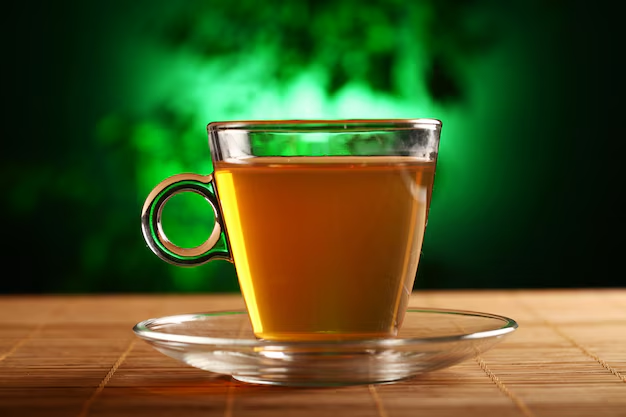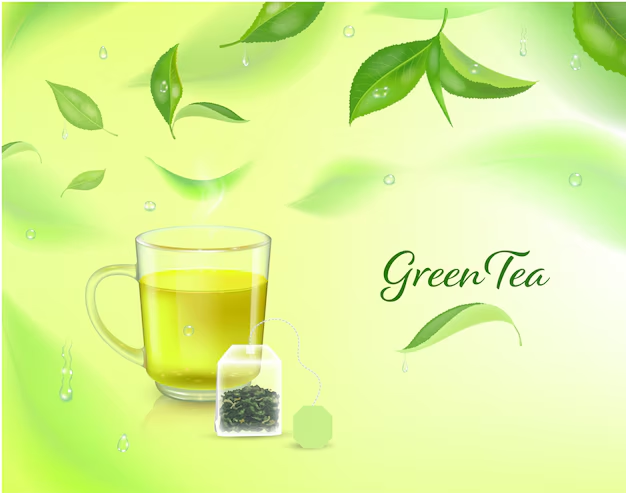Green tea is one of the most popular beverages in the world, known for its delicate taste and health benefits. But is green tea high in caffeine? This question matters to health-conscious individuals who enjoy tea but want to manage their caffeine intake. While caffeine can boost energy and alertness, too much of it may cause unwanted side effects like insomnia or jitters. Let’s take a closer look at green tea, its caffeine content, and how it compares to other drinks.
What is Green Tea?
Green tea is a type of tea made from the leaves of the Camellia sinensis plant. Unlike black tea, which is fully oxidized, green tea undergoes minimal oxidation. This process helps preserve its light flavor and rich antioxidant content.
But what makes green tea so special? It’s packed with polyphenols, which are natural compounds that act as antioxidants. These antioxidants help protect cells from damage and may reduce inflammation. Additionally, it contains small amounts of vitamins, minerals, and, of course, caffeine.
What Is Green Tea Good For?
Green tea is praised for its numerous health benefits. Studies suggest it may improve brain function, boost metabolism, and even lower the risk of chronic diseases. Drinking green tea regularly may also support heart health and aid in weight management.
Is Green Tea Good for You?
Yes, green tea is good for most people. Its antioxidants and bioactive compounds make it a great addition to a healthy lifestyle. However, its caffeine content should be considered if you’re sensitive to stimulants or managing specific health conditions.
How Much Caffeine is in Green Tea?
The amount of caffeine in green tea can vary, but on average, a standard 8-ounce cup contains about 20–50 milligrams (mg) of caffeine. In comparison, the same serving size of coffee contains around 95 mg, making this tea a lower-caffeine alternative.
Factors That Influence Caffeine Levels in Green Tea
- Type of Tea Leaves
Younger tea leaves, like those used in premium varieties such as matcha, tend to have higher caffeine levels.
- Brewing Time
The longer you steep green tea, the more caffeine is released into your cup. A quick brew (1–2 minutes) will result in less caffeine compared to a longer steep.
- Serving Size
A larger serving will naturally contain more caffeine. For instance, a 16-ounce cup will have double the caffeine of an 8-ounce serving.
Is Green Tea High in Caffeine?
When comparing green tea to other caffeinated beverages, it’s clear that green tea is not high in caffeine. Here’s a breakdown:

| Beverage | Caffeine Content (per 8 oz) |
| Coffee | 95 mg |
| Black Tea | 40–70 mg |
| Green Tea | 20–50 mg |
| White Tea | 15–30 mg |
| Decaffeinated Tea | Less than 5 mg |
Green tea contains less caffeine than black tea and significantly less than coffee. However, it has more caffeine than white tea or decaffeinated options.
Caffeine in Black Tea vs. Green Tea
Black tea generally contains 40–70 mg of caffeine per cup, which is nearly double the amount found in green tea. This is because black tea undergoes a different oxidation process, which concentrates its caffeine content. For those who want a moderate caffeine boost without the intensity of coffee or black tea, green tea is an excellent choice.
Benefits of Drinking Green Tea
Green tea is a treasure trove of health benefits. It’s not just a refreshing beverage; it’s also packed with compounds that can positively impact your body and mind.
Antioxidants for Overall Health
Green tea is rich in antioxidants, especially catechins like EGCG (epigallocatechin gallate). These powerful compounds help fight free radicals, reducing oxidative stress and protecting cells from damage. Regular consumption may lower your risk of chronic diseases like cancer and diabetes.
Weight Loss and Metabolism
One of the standout benefits of drinking green tea is its ability to boost metabolism. Studies show that the caffeine and catechins in green tea can enhance fat burning. This makes it a popular choice for those trying to shed extra pounds.
Heart Health
Green tea is also heart-friendly. Its antioxidants can lower bad cholesterol (LDL) levels and improve blood vessel function. These effects contribute to a reduced risk of heart disease.
Mental Alertness and Relaxation
The moderate caffeine content in green tea helps improve focus and alertness without the jitters often associated with coffee. Additionally, it contains L-theanine, an amino acid that promotes relaxation and reduces stress.
Evidence Supporting Green Tea Benefits
Research backs these claims. A study published in the Journal of Nutrition found that individuals who drank green tea daily experienced improved cardiovascular health and metabolic function. Incorporating green tea into your routine could be a simple yet effective way to enhance your well-being.
Side Effects of Green Tea
While green tea is generally safe and beneficial, it’s not without potential downsides, especially if consumed in excess.
Caffeine Sensitivity
The caffeine in green tea can cause side effects in some individuals, such as:
- Jitteriness or anxiety.
- Insomnia if consumed close to bedtime.
- Stomach upset or acid reflux, particularly on an empty stomach.
Iron Absorption and Other Concerns
Green tea’s tannins can interfere with the absorption of non-heme iron from plant-based foods. For people with iron deficiency, it’s best to drink green tea between meals rather than during them.
Moderation is Key
Most of these side effects can be avoided by drinking green tea in moderation. For most people, 2–3 cups per day is safe and provides plenty of benefits without adverse effects.
What Happens if I Drink Green Tea Every Day?
Drinking green tea daily can be a game-changer for your health and well-being. Let’s explore the potential benefits and considerations.
Positive Effects of Regular Consumption
- Improved Metabolism: Drinking green tea daily can enhance fat oxidation, helping with weight management.
- Boosted Immunity: The antioxidants in green tea strengthen the immune system.
- Better Focus and Calmness: L-theanine promotes mental clarity while reducing stress.
Potential Drawbacks of Overconsumption
Overindulging in green tea might lead to excessive caffeine intake, causing side effects like restlessness or sleep disturbances. For individuals sensitive to caffeine, switching to decaffeinated green tea might be a better option.
How to Enjoy Green Tea Daily Safely
Start with one to two cups a day and gradually increase based on your tolerance. Drinking green tea as part of a balanced diet can amplify its benefits without causing harm.
To Read: Is Tea Good for Your Heart? Different Teas Effects
Caffeine in Green Tea vs. Black Tea

Both green and black teas come from the same plant, but they differ significantly in caffeine content and preparation methods.
Caffeine Content
- Green tea: 20–50 mg per cup.
- Black tea: 40–70 mg per cup.
This makes green tea a milder option for those looking to reduce their caffeine intake.
Taste and Preparation
Green tea has a light, grassy flavor, while black tea is bolder and more robust. Green tea is usually brewed for a shorter time (1–2 minutes), while black tea is steeped longer, which also extracts more caffeine.
Health Benefits
Both teas are healthy, but green tea is often considered superior for its higher antioxidant levels. Black tea, however, is a great choice for a stronger caffeine kick.
Is Green Tea Good for Sleep?
Despite containing caffeine, green tea can be good for sleep when consumed in moderation.
Low Caffeine Content
Green tea has less caffeine than black tea or coffee, making it less likely to disrupt your sleep, especially if consumed earlier in the day.
L-Theanine for Relaxation
L-theanine in green tea helps calm the mind and reduce stress. This compound balances the stimulating effects of caffeine, making green tea a unique blend of energizing and soothing properties.
Tips for Sleep-Friendly Consumption
- Opt for decaffeinated green tea if you’re particularly sensitive to caffeine.
- Avoid drinking green tea at least 2–3 hours before bedtime.
By being mindful of when and how much you drink, you can enjoy green tea without compromising your sleep.
FAQs
Which tea is highest in caffeine?
Matcha and black tea typically contain the highest caffeine levels among teas. Matcha can exceed 70 mg per cup, while black tea averages 47 mg per cup.
What tea has the least caffeine?
White tea and herbal teas usually have the least caffeine. Herbal teas like chamomile are naturally caffeine-free.
Does caffeine in green tea keep you awake?
Yes, green tea’s caffeine may keep you awake, but its lower caffeine levels compared to coffee and calming L-theanine often result in balanced energy.
Is green tea OK for sleep?
Yes, green tea can be okay for sleep when consumed earlier in the evening. Opt for decaffeinated varieties or drink in moderation to avoid sleep disruptions.
Conclusion
So, is green tea high in caffeine? Not really. Compared to coffee and black tea, green tea has significantly less caffeine, making it a gentler option for those looking to enjoy the benefits of a caffeinated beverage without overdoing it. Its health benefits, from improved metabolism to heart health, make it an excellent choice for daily consumption. Just remember to enjoy it in moderation to maximize its positive effects while avoiding potential side effects.

